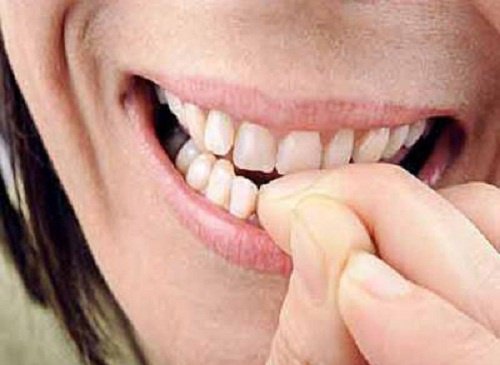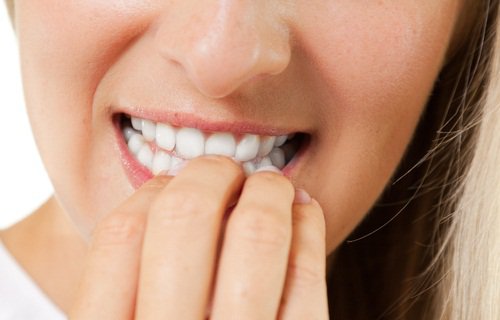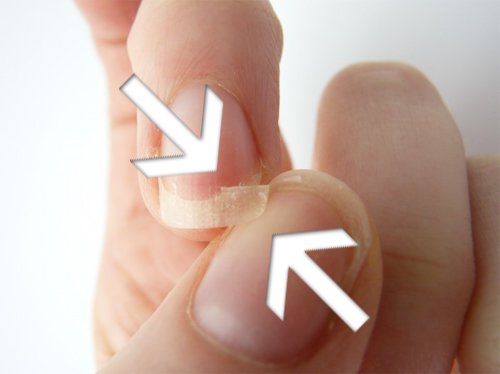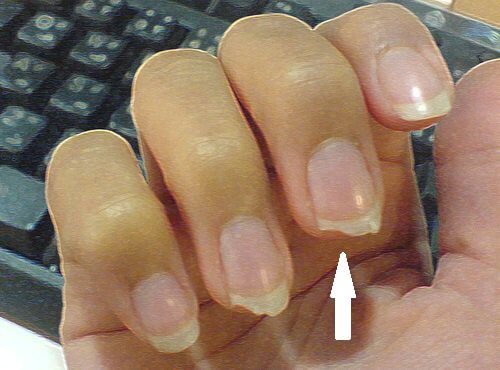Nail-Biting: What Does it Say About Your Personality?

Nail-biting is a common habit with a strong like to our emotions. Some people hold onto this bad habit for their entire life, while others only fall into it when they feel stressed or anxious.
Nail-biting: a persistent, bad habit
Repeatedly biting your nails is the problem that we’re going to talk about today. Some people suffer from an intense form of this problem and are unable to do anything because their hands are always in their mouth. This has a special term: “onychophagy.”
It’s more than just an aesthetic problem. It makes you feel ashamed to shake hands with other people and display your fingers, among other things. About 50% of the population, mainly women, has this problem. It tends to occur start between ages 10-18 and can last for the person’s entire life.
Most people who try to stop biting their nails by using topical solutions end up failing. Why? The causes of onychophagy are things like anxiety, nervousness, depression, stress, boredom, personal problems or sadness.
Read more:

Nervous or negative habits can start after a tiny, unnoticeable change in your day. Once you start down this path, you generally end up doing them more often throughout the day.
The main problem with nail-biting is that you’re not always aware of what you’re doing. You probably won’t realize you’re doing it until someone points it out, or until you hurt yourself. Basically, it’s an automatic response to a problem, an escape, a way to put off or avoid expressing your feelings, etc…
People who live around nail biters are also part of the problem. This is because, although they may see it as a problem at the beginning, they end up treating it as normal, and start to ignore it.
People who have this issue become very used to biting their nails, and they connect it with activities like watching TV, reading, talking, etc.
How does nail-biting start?
Psychologists have come up with a list of the main causes of nail-biting. Pay attention, because these could help you understand your personality better, too.
Nervousness
When you’re stressed, have lots of problems, or feel anxious, you’re more likely to bite your nails. The need to find an escape is generally what causes you to start. It doesn’t help that biting your nails has a calming effect on your nervous system.

Boredom
Not having anything to do, being inactive, or feeling bored are also common causes of nail-biting. This habit stimulates the nervous system, which can help you to stay awake, to give one example.
Perfectionism
People who bite their nails tend to spend many hours of the day looking at their hands and making sure that their nails are absolutely perfect. If they find any imperfections, they automatically try to fix them. It’s worth pointing out that this habit causes problems in your teeth, hands, and skin.
Imitation
Lots of children who bite their nails start after seeing their parents do it. In the case of patients who are over 18 years old, onychophagy tends to show up as part of an anxiety disorder, or because of a tic, hyperactivity, or obsessive compulsive disorder.

Psychosomatic causes
Many people bite their nails to cause themselves pain, injury, etc… This can occur with violent families, children who were subjected to severe parenting styles, or as a way to gets people’s attention.
Emotions
Shyness and low self-esteem, as well as the pain caused by divorce or the death of a loved one, can cause people to bite their nails. The habit tends to go away if and when the person starts to feel more self-confident and trusts their environment again.
You might like:
The Best Advice for Raising Self-Esteem
Nail-biting kids: what you need to know
A recent study shows that young children who bite their nails tend to have less social skills than children who don’t. The habit shows up in about 45% of kids in industrialized countries (compared with 10% in adults). It’s part of an anxiety disorder, which means it’s an attempt to reduce anxiety levels. The problem is that it has negative consequences for a child’s body and self-esteem.
There are lots of reasons why someone might bite their nails, and it can become an unconscious thing, like an automatic reflex. Kids also don’t realize that they’re harming themselves and as time goes on, it becomes very difficult for them to drop the habit, experts say.
Children who have problems at school–things like bullies, poor performance in class, etc—or who live in an unhealthy environment are more likely to suffer from this problem.
When faced with stressful situations, nervousness, distress, or personal dissatisfaction, they bite their nails as a way to escape. Although this condition isn’t serious if spotted early on and treated properly, it’s also worth pointing out that if a child starts biting their nails before the age of 10, they should see a psychologist.
Usually, the habit goes away once they start to feel embarrassed about their hands. Or, in the case of young girls, when they start wanting to wear makeup, do their hair, etc… This generally starts around age 13.
That’s why experts remind us nail-biting is related to social issues. Children feel sad about something and then isolate themselves from their peers and start biting their nails. This begins a vicious cycle because, now that their hands are all bitten up and don’t look very nice, they retreat even further.
All cited sources were thoroughly reviewed by our team to ensure their quality, reliability, currency, and validity. The bibliography of this article was considered reliable and of academic or scientific accuracy.
- Ghanizadeh, A. (2008). Association of nail biting and psychiatric disorders in children and their parents in a psychiatrically referred sample of children. Child and Adolescent Psychiatry and Mental Health, 2(13). https://doi.org/10.1186/1753-2000-2-13
- Ghanizadeh, A., & Shekoohi, H. (2011). Prevalence of nail biting and its association with mental health in a community sample of children. BMC Research Notes, 4(116). https://doi.org/10.1186/1756-0500-4-116
- Ghanizadeh A. (2011). Nail biting; etiology, consequences and management. Iranian Journal of Medical Sciences, 36(2), 73–79. https://www.ncbi.nlm.nih.gov/pmc/articles/PMC3556753/
- Grant, J. E., Odlaug, B. L., & Kim, S. W. (2010). A clinical comparison of pathologic skin picking and obsessive-compulsive disorder. Comprehensive Psychiatry, 51(4), 347–352. https://doi.org/10.1016/j.comppsych.2009.10.006
- Singal, A., & Daulatabad, D. (2017). Nail tic disorders: Manifestations, pathogenesis and management. Indian Journal of Dermatology, Venereology, and Leprology, 83(1), 19-26. https://doi.org/10.4103/0378-6323.184202
- Sisman, F. N., Tok, O., & Ergun, A. (2017). The effect of psychological state and social support on nail-biting in adolescents: An exploratory study. School Psychology International, 38(3), 304–318. https://doi.org/10.1177/0143034317690578
- Weijenberg, R. A. F., & Lobbezoo, F. (2015). Chew the Pain Away: Oral Habits to Cope with Pain and Stress and to Stimulate Cognition. BioMed Research International, 2015(149431), 1–7. https://doi.org/10.1155/2015/149431
This text is provided for informational purposes only and does not replace consultation with a professional. If in doubt, consult your specialist.








